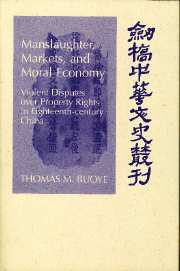 Manslaughter, Markets, and Moral Economy
Manslaughter, Markets, and Moral Economy Book contents
- Frontmatter
- Contents
- List of Maps, Figures, and Tables
- List of Qing Dynasty Emperors' Reign Dates
- List of Weights and Measures
- Acknowledgments
- Introduction
- 1 Economic Change, Social Conflict, and Property Rights
- 2 “Population Increases Daily”: Economic Change during the Eighteenth Century
- 3 “As Before Each Manage Their Own Property”: Boundary and Water-rights Disputes
- 4 “Crafty and Obdurate Tenants”: Redemption, Rent Defaults, and Evictions
- 5 Temporal and Geographic Distributions of Property-rights Disputes in Guangdong
- 6 Violence North, West, and South: Property-rights Disputes in Shandong, Sichuan, and Guangdong
- 7 “You Will Be Rich but Not Benevolent”: Changing Concepts of Legitimacy and Violent Disputes
- 8 Conclusion
- Appendix
- Bibliography
- Index
1 - Economic Change, Social Conflict, and Property Rights
Published online by Cambridge University Press: 28 October 2009
- Frontmatter
- Contents
- List of Maps, Figures, and Tables
- List of Qing Dynasty Emperors' Reign Dates
- List of Weights and Measures
- Acknowledgments
- Introduction
- 1 Economic Change, Social Conflict, and Property Rights
- 2 “Population Increases Daily”: Economic Change during the Eighteenth Century
- 3 “As Before Each Manage Their Own Property”: Boundary and Water-rights Disputes
- 4 “Crafty and Obdurate Tenants”: Redemption, Rent Defaults, and Evictions
- 5 Temporal and Geographic Distributions of Property-rights Disputes in Guangdong
- 6 Violence North, West, and South: Property-rights Disputes in Shandong, Sichuan, and Guangdong
- 7 “You Will Be Rich but Not Benevolent”: Changing Concepts of Legitimacy and Violent Disputes
- 8 Conclusion
- Appendix
- Bibliography
- Index
Summary
Since the normalization of diplomatic relations between China and the United States in the 1980s, American scholars have gradually gained access to a wide range of primary source materials that have enriched the quality and extended the scope of historical research on China. Throughout the 1950s and 1960s, the limited access to primary sources stifled the field of Chinese social and economic history in the United States. Except for the works of several Chinese-born scholars, such as Ho Ping-ti, who produced the classic work on demographic history; Chang Chung-li, whose work on the gentry class remains standard reading; and Hsiao Kung-ch'uan, who wrote a comprehensive guide to rural society, most of the research done in English focused on foreign trade, the treaty ports, or early efforts at industrialization. Conceptually, models derived from European economic history weighed heavily on the scholarship of this period and this produced some rather odd attempts to cast Chinese history in terms of the supposed normative stages of Western development. Generally, the economic stagnation of pre–Opium War China was taken for granted, and comparisons of Western development with Eastern stagnation were frequent. Ironically, the Marxist approach of Chinese and Japanese scholars prevalent at that time, although meant to challenge mainstream Western scholarship, also contributed to establishing the paradigm of Western progress, the Industrial Revolution, as the yardstick for measuring historical development.
After the establishment of the People's Republic of China in 1949, historical research in China was entirely recast in terms of the normative stages of Marxist historical development. Two popular topics in post- 1949 Chinese historiography were studies of peasant uprisings and the identification of the “sprouts of capitalism.”
- Type
- Chapter
- Information
- Manslaughter, Markets, and Moral EconomyViolent Disputes over Property Rights in Eighteenth-Century China, pp. 17 - 33Publisher: Cambridge University PressPrint publication year: 2000


